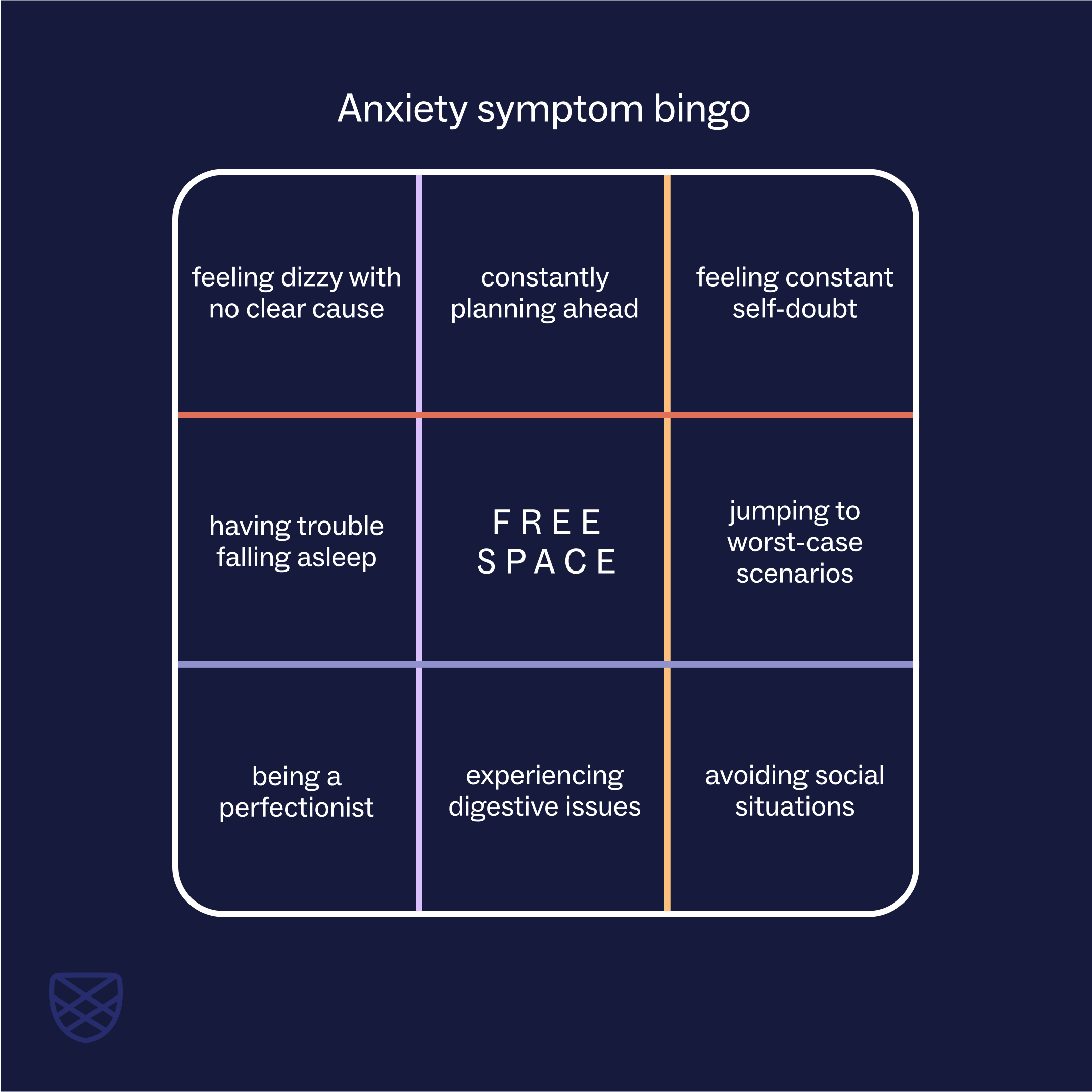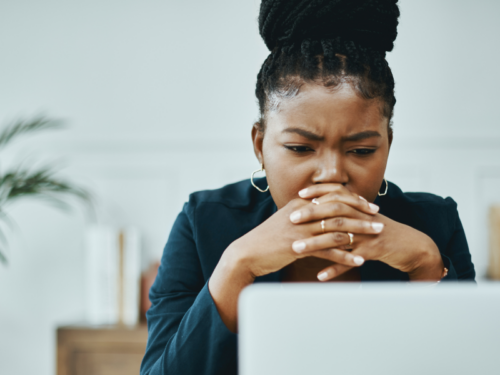
Table of Contents
Debilitating Anxiety: Symptoms, Causes, and Treatment

Written By: Sarah Fielding

Clinically Reviewed By: Dr. Don Gasparini
June 6, 2023
8 min.
It’s a term that describes experiences of anxiety that are overwhelming or limit your ability to function day-to-day.
Learn more about our Clinical Review Process
Table of Contents
Many young people across the United States have anxiety disorders. According to the Centers for Disease Control and Prevention (CDC), 9.4% of people ages three to 17 lived with an anxiety disorder between 2016 and 2019. Anxiety symptoms can vary from more minor worries to intense fear and concern. The latter often manifests as debilitating anxiety — when a person’s anxiety becomes overwhelming and limiting to their daily life. Medical professionals use “debilitating anxiety” to describe anxiety’s impact, not as a mental health diagnosis in and of itself — just like you would say a person has “mild” or “moderate” anxiety. It explains the severity of the anxiety, but is not a clinical diagnosis.
Debilitating anxiety is characterized by “extreme anxiety, frequent panic attacks, and avoidance behaviors,” says Michelle Giordano, a community counselor and outreach specialist for Live Another Day. “This degree of anxiety can have a significant negative influence on a variety of facets of life, such as relationships, social interactions, academic or professional performance, and general well-being.”
What is debilitating anxiety?
As mentioned, debilitating anxiety is the term used to describe when anxiety and other negative symptoms associated with these disorders interfere with a person’s life, sometimes to the point of immobilizing or numbing them. “‘Debilitating’ is a way to describe the severity of one’s anxiety, though it is not an official diagnosis,” emphasizes Julia Baum, MSEd, BFA, a licensed mental health clinician and founder of Julia Baum Therapy.
The definition of debilitating says it all: “causing serious impairment of strength or ability to function.”
Debilitating anxiety will look different from person to person, with some cases more outwardly evident than others. “The phrase ‘debilitating anxiety’ should only be used when symptoms are severe, persistent, and severely interfere with a person’s ability to do daily tasks and fulfill obligations,” explains Giordano. Severe symptoms can include:
- Feeling out of control
- Avoiding typically safe situations
- Experiencing extreme anxiety in specific experiences
- Selective mutism
- Strong and persistent physical symptoms such as nausea and dizziness

A person with debilitating anxiety will likely experience severe symptoms regularly, thus disrupting their ability to live as they would otherwise choose. According to Giordano, these symptoms are typically persistent. They can also impact your ability to cope and treat other health conditions. Experiencing anxiety can intensify pre-existing physical health issues, like gastrointestinal problems or breathing difficulties, she explains. It can also make you more susceptible to medical issues.
“Long-term, severe anxiety causes the body to respond to stress by releasing substances called stress hormones that can negatively affect the immune system, cardiovascular system, and digestive system,” says Giordano. “This could make people more susceptible to infections and make the signs of pre-existing illnesses worse.”
Debilitating anxiety can also increase your likelihood of developing other mental health disorders, like depression or a substance use disorder. A 2020 study from the American Journal of Psychiatry found a lifetime comorbidity of depression in 50% of people living with panic disorder and 43% of people living with general anxiety disorder.
In some instances, debilitating anxiety might be a barrier to taking any necessary steps or caring for yourself. “An individual with debilitating social anxiety may avoid calling to make a doctor’s appointment or showing up for it,” says Baum. “They may not attend an appointment if they have debilitating anxiety about driving, public transportation, or leaving the house. They may refuse prescribed medication due to debilitating anxiety about how it will affect their body or mistrust in the prescriber.”
You might also find yourself avoiding other stressors like difficult conversations, moving homes, or even telling someone about the state of your mental health. Baum adds that this avoidance ends up causing additional stressors in a negative cycle that requires care and time to overcome.
What are the different types of anxiety disorders?
There is a range of anxiety disorders, any of which can become debilitating. Here’s an overview of how some common anxiety disorders look.
Generalized anxiety disorder
Generalized anxiety disorder includes symptoms like excessive worry, seeking constant reassurance, restlessness, and self-esteem issues. It can also include procrastination, irritability, and unexplained body aches.
Panic disorder
This disorder is marked by the occurrence of at least two panic attacks and persistent concern for at least one month about having another one. About 2% of adolescents live with a panic disorder, according to the National Institute of Mental Health. Overall, about 50% of people with a panic disorder first experienced symptoms before the age of 25, the National Library of Medicine reports. This condition is characterized by a sense of doom during a panic attack, sudden feelings of anxiety, and avoiding places you previously had a panic attack. Basically, your “fight or flight” instincts kick in without a need for that level of concern.
Social anxiety disorder
Previously known as social phobia, social anxiety disorder involves extreme fear and anxiety about entering a social situation. This can be anything from attending a family gathering to entering the cafeteria at lunchtime. An estimated 7% of American adults experience social anxiety disorder, with most individuals reporting that symptoms first emerged during childhood, according to the Anxiety & Depression Association of America. If you have social anxiety disorder, you might experience fear of embarrassment, judgment, or having your anxiety noticed by others. Physical symptoms can include difficulty making eye contact, dizziness, and a rapid heart rate.
Phobias
Being afraid of climate change or slipping on icy roads are realistic, pressing fears. Phobias, on the other hand, are an intense, irrational fear of something non-threatening — especially not to the degree you’re scared of it. Common phobias include achluophobia (a fear of darkness), hydrophobia (a fear of water), and arachnophobia (a fear of spiders). There’s even a name for having a phobia of fears — phobophobia.
Separation anxiety disorder
This disorder is characterized by feeling tremendous anxiety when apart from a loved one and worrying that something terrible will happen to them. At its most severe, someone with separation anxiety might have monophobia, an immense fear of being alone.
“It’s crucial to stress that only trained mental health specialists should diagnose anxiety disorders because they take into account a number of criteria before doing so,” adds Giordano.
Critically, like all mental health disorders, help is available for all of these anxiety disorders, and, the sooner you seek help, the sooner anxiety’s control on your life can significantly lessen.
Join the Charlie Health Library
Get mental health updates, research, insights, and resources directly to your inbox.
You can unsubscribe anytime.
What to do when your anxiety becomes debilitating
In an ideal world, you would start treating anxiety before it becomes debilitating. Yet, this is often not possible, typically for reasons entirely out of a person’s control, such as access to care and a lack of awareness about mental health. These barriers mean it can take reaching debilitating anxiety to fully understand and seek help for what you’re experiencing. As a young person, there are a few steps to take when your anxiety becomes debilitating.
Talk to a trusted adult
It’s OK if this trusted adult isn’t your parent — it might be a friend’s parent, a teacher, or a school counselor. The critical aspect is to talk to an adult who will listen to you and can help you get the answers and support you need. It can also help to speak with an understanding friend about how you feel in general or to get advice on an adult to approach.
Speak with a medical professional
Your first point of contact might not be a mental health professional. Your primary care doctor might already know your background with anxiety or might be the most accessible (in time and cost) route to discuss how you feel with a trained professional. A primary care doctor can review your symptoms and recommend options like therapy, medication, and individual coping techniques, Young Minds reports.
Medical support
Therapy and medication are effective options for managing debilitating anxiety. Cognitive behavioral therapy (CBT) is a recommended option for understanding the factors leading to debilitating anxiety and learning coping mechanisms. Antidepressants (SSRIs) and anti-anxiety medication (benzodiazepines) are both potential options to explore with the care of medical professionals.
Holistic support
There are many options for managing debilitating anxiety that you can try on your own or with a loved one. Meditation, journaling, exercising, and spending time in nature can all help with your anxiety.
How to help as a parent
One of the most important things you can do as a parent when your child comes to you with debilitating anxiety is to listen to and believe them. They are the experts on their own bodies and thoughts — trust them to know how they feel. Don’t blame it on “hormones” or “a recent disagreement with a friend.” Once you show them they can trust you to share their feelings, support them in their journey to manage debilitating anxiety.
Part of your support comes with the above steps young people can take. Do they need someone to drive them to the doctor or help them search for reputable (and affordable) therapists? Can you integrate mindfulness practices, journaling, or whatever holistic techniques lessen their anxiety into your time together?

If your child doesn’t come to you, Mental Health America recommends looking out for anxiety symptoms — debilitating or otherwise. In the case you notice some, create an open dialogue. Discuss the apparent signs with them while ensuring a calm, non-judgemental environment. A good way to do this is to use yourself to normalize negative feelings. Talk about your own emotions and regularly create a safe space to express them. Explore additional steps of support, like visiting a mental health professional and talk about coping techniques, when helpful.
As mentioned earlier, treatment options for anxiety include CBT and medication. CBT centers around identifying thoughts and patterns fueling anxiety and learning how to shift and reframe them. It can be helpful in individual, group, or family therapy. CBT can aid young people with debilitating anxiety to change their negative thoughts, cope with challenging emotions, and improve their self-esteem. In addition to CBT, a medical professional might prescribe antidepressants (SSRIs) or anti-anxiety medication.
How Charlie Health can help
Charlie Health’s virtual Intensive Outpatient Program (IOP) supports people experiencing a range of symptoms from anxiety disorders. They can also aid in determining what coping mechanisms would have the most significant impact. Connect with a professional here.





